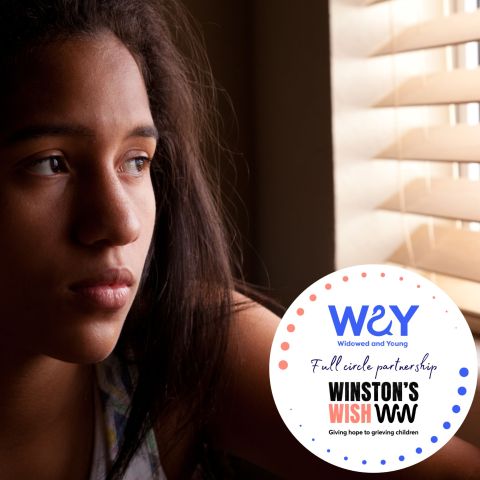How to support a child bereaved by suicide
September 2025
Families bereaved by and dealing with loss from suicide may also have to face agonising questions, intrusive public scrutiny and cope with extra emotions such as guilt, shame and self-blame. Children and young people may need extra support to help them cope with their grief.

Our friends at childhood bereavement charity Winston’s Wish have shared some ways you can help support your child following a bereavement by suicide.
Be honest and give age-appropriate information
It is natural for a parent or carer to want to protect their child from pain after the death of someone important, especially a death by suicide. You may be tempted to tell your child that the death was an accident but, from our experience, it’s helpful to try and be open and honest from the start.
A suicide can quickly become public knowledge with police visits, an inquest, media interest and social media, and your child may hear rumours and fragments of information. An honest explanation of the facts, in language appropriate to a child’s age, given by people they can trust and who will continue supporting them, is often the best protection you can give your child.
Keep checking in and encourage questions
Children’s understanding of what has happened will evolve as they get older and you may find they have lots of questions days, weeks, months or even years after. Continuing conversations and building on their knowledge as you feel appropriate is important.
Encourage your child to ask questions. This will help you to find out what they are thinking and how they are coping. Remember that you don’t have to have all the answers. Be honest, if you don’t know or don’t feel able to answer the question immediately you could say something like: “That’s a very important question. I need some time to think about it. Let’s talk about it this evening.” Make sure you do talk about it when you say you will.
Acknowledge all of their emotions
Children (and adults) bereaved by suicide may experience a whole range of often conflicting emotions. They may feel shock or numb, anger, guilt, relief, sadness, shame or even feeling rejected or betrayed. All of these feelings are normal and valid. Helping your child to name and understand these feelings and reassuring them that they are valid can help them manage these overwhelming feelings.
Help them find ways to express their feelings
Children often communicate through play, drawing or stories, especially younger children. You could encourage activities like journalling, drawing or creating a memory box to help your child express their feelings in ways other than talking. This can help ensure they aren’t bottling up their feelings and help you understand and talk things through with them if needed.
Find ways to remember the person who died
Sometimes it can be hard to find a balance between the difficult memories that are often associated with a death by suicide and happier, more positive memories. One way to help your child hold on to positive memories could be to create a memory box where they can keep special things connected to the person who has died. This could be photos, cards/letters, jewellery, clothing, or anything that is special to them.
Working with their school
It is important that your child’s school and all the staff who come into contact with them know what has happened so they can offer support. Talking with the school will give you the chance to tell them what information your child knows and the language you would like them to use. It can also help to talk to your child about returning to school and help them prepare some answers to questions about the death of their person, so they feel more confident and prepared.
Help them cope with separation
It’s not unusual for children to be worried about being separated from their important people after someone has died, especially if that death was sudden and unexpected like a suicide bereavement.
Here are a few ideas that may help:
- Listen to your child’s fears and try not to downplay their feelings – feeling validated and heard can help reduce their anxiety.
- Slowly introduce smaller separations to work up to a longer one like a school day.
- Offer lots of reassurance – let them know when you are going, where you are going and when you will be back.
- Let them take a small item with them that reminds them of you or of home – some people like to have identical items (like two teddies), the child keeps one and the parent or guardian keeps the other.
- Plan something special to do together after the separation.
- Create a short goodbye ritual that’s comforting and consistent.
About Winston’s Wish
Winston’s Wish is a charity that helps children, teenagers and young adults (up to the age of 25) find their feet when their worlds are turned upside down by grief.
If you’re an adult supporting a bereaved child or young person who is struggling with their grief, you can call Winston’s Wish on 08088 020 021, email ask@winstonswish.org or use the live chat on their website (all available 8am-8pm, weekdays). They will be able to offer guidance, information and support.

Your donations are always welcome.
Donate